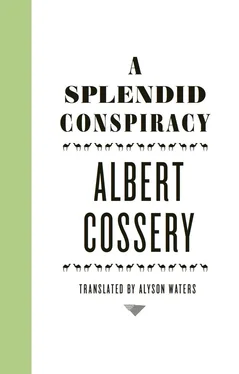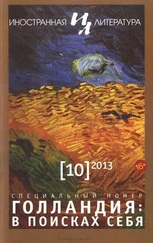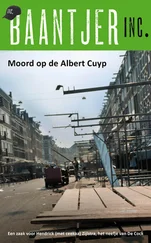The previous day, when they had met unexpectedly in the street, Felfel had arranged this rendezvous as if she were a breathless conspirator pursued by a pack of policemen; then she rode off on her bicycle like some mythical creature, without leaving him time to respond. The bold artlessness with which the girl had tried to hatch a love affair had greatly surprised Teymour and, at the same time, filled him with unanticipated happiness. He was impatient to learn just how this mysterious meeting with the young saltimbanque would unfold. Suddenly it seemed as if there were no superior places for love. Even in this dismal city, frozen in its gloomy austerity, hidden forces were at work to encourage desire. With genuine anxiety he looked in every corner of the square, hoping to see little Felfel’s figure emerge as she sliced through the air on her bicycle. But the huge square was empty; he saw only a police officer of the most moronic kind walking at the speed of a grazing cow, half asleep with a sulky expression, for it was siesta time. As if drawn by a magnet, this policeman, lonely and starved for power, was heading straight for the statue. For a moment Teymour imagined he was going to interrogate it for some breach of the law, but in reality the policeman had it in for the poor beggar sleeping against the railing; no doubt he was jealous of the man’s blessed fate.
The officer bent down, grabbed the man by the shoulders and shook him with that skillful sadism so characteristic of policemen carrying out their duties.
“Hey you, wake up!” he said. “You should be ashamed to be sleeping here, my man!
The vagabond turned his head, opened a bleary eye, and asked in a calm and distant voice:
“Why would I be ashamed?”
“What!” cried the officer indignantly. “Don’t you realize you’re sleeping beneath The Awakening of the Nation? Show a little respect, my man.”
The dirty, wrinkled face of the man took on an expression of immense weariness, as if the officer’s remonstrance were coming from infinitely far away and a superhuman effort were necessary for him to understand and react to it. He closed his eye and answered with morose seriousness:
“There’s no rush. When you have woken up the entire nation, let me know. Why should I be the first?”
And he went back to sleep.
The officer gave vent to his rancor by spitting on the statue’s pedestal, then walked away shaking his head as if he no longer understood the reasons for his presence on earth. His authority had been thwarted by a beggar’s destitution and ignorance, and this incident — which occurred repeatedly — overwhelmed him with inexpressible despondency. A ghostly silhouette, he faded slowly, swept up by the dust that swirled across the square.
This surprising dialogue had the opposite effect on Teymour; it caused him to burst out laughing. For a moment this laughter was uncontrollable, as if he were drunk. Then he realized what bad manners it would be to disturb the noble sleeper with his boisterous, misplaced good spirits. He suddenly stopped laughing and allowed his gaze to rest upon the man with brotherly affection.
At the risk of breaking her neck, Felfel was pedaling as fast as she could through the treacherous streets. With great skill she circumvented puddles, avoided potholes, and threaded her way among the horde of street children without slowing down or stopping. And sometimes, while she was performing these amazing feats, she would raise her head to admire a sliver of blue sky between the rooftops of houses with their crumbling façades; she found a resemblance between this sunny afternoon and the elation that gripped her heart — a young girl in love racing to her first date. For this exceptional occasion she had scrubbed her face and replaced her saltimbanque’s outfit with a short cotton print skirt, an almost transparent yellow blouse, and white canvas shoes that had just been polished; the final touch to this elegant outfit was a slightly shabby leather bag slung across her shoulder that struck her on the side as she pedaled furiously. Dressed in this way, with her hair combed and braided, without a trace of makeup, she looked like a barely nubile little girl racing to school. Her desire to surprise Teymour had inspired her to carry out this magnificent metamorphosis — showing herself to him as wholesome, childish — the only thing that could in novelty rival the charming sophisticated creatures he had loved during his travels. She was counting on her youth to make him forget those distant conquests that his memory still cherished. Nonetheless, she remained vaguely fearful. In Teymour’s prestigious person there was something of the inaccessible ideal that worried her; the young man seemed to have fallen from another planet. When she’d first seen him sitting on the café terrace and brooding, she’d understood that he did not belong in these abominable surroundings and that he was not going to drag out his exile here. She had smiled at him instinctively, as if trying to help him endure his misery, with the hope that he would recognize in her smile a sign of a complicity that united them in their shared horror of this city. She had believed she could buy time in this way — and save for later everything in her power to hold on to him through her tenderness and her love. When she had approached him the previous day on the street to set up the meeting to which she was now impatiently hastening, she had intended to confess her decision to belong to him without further delay. Teymour might leave the city from one moment to the next and she would have no warning; it was becoming urgent not to abandon him any longer to his depressing solitude. But what would happen if she had come too late, and, worse, if he were not interested in the love she had to offer? After all, she was only a child of the people, obliged in order to get by to perform this thankless job that was almost like begging. Yes, she was nothing put a poor beggar. She made a sad little pout at the sudden realization of her lowliness and began pedaling with increased ardor. The possibility that Teymour might rebuff her made her want to throw herself off a cliff and die.
So filled was her mind with the apprehension and joy of seeing Teymour again that, until the very last second, she did not see the obviously troubled man crossing the road deep in thought who was about to collide with her bicycle’s front wheel. She braked just in time to avoid running him over, placed one foot on the ground, and was about to curse him when she saw that he was none other than her brother Rezk.
“So, this is how you crush the people!” said Rezk smiling as if he were delighted by this encounter.
“I’m sorry,” said Felfel. “I didn’t see you there.”
“That’s all right.” Then, noticing Felfel’s carefully chosen attire, he said:
“My word! You’re dressed like a princess. Where are you rushing?”
“Nowhere in particular,” the young girl answered; his question, and the mocking tone with which he showed his curiosity, unsettled her.
“Don’t lie; I know everything.” Rezk was still smiling and a glimmer of affection shone in his eyes, as if to give his words a sweet meaning of complicity.
“What do you know?”
“Oh, nothing,” answered Rezk, patting her on the shoulder. “And don’t you worry about a thing. I was only teasing you. Go on, get out of here and have fun.”
Just as he was about to leave the young girl, he sensed someone watching them from across the street. He turned his head ever so slightly and was suddenly submerged by a wave of indignation that left him breathless. Hatred — a hatred that had the intensity of excruciating pain — made his limbs tense, clouded his eyes with tears, and covered his features with a livid mask. The man standing next to an orange seller’s cart intently ogling Felfel’s bare legs was the very man eating away at Rezk’s insides. The gaze seeping from under his eyelids and expressing the most blatant lewdness belonged to the despised foe so long the object of his enmity; in rare moments of respite Rezk managed to forget him, the way one forgets one has an incurable illness. With the elegance of a provincial satyr, Chawki was leaning with one hand on his cane while with his other he was lasciviously twisting the end of his mustache. His lips were curled in a greedy pout and he looked as if he were debating with himself about the quality of the oranges, which the orange-seller was shamelessly comparing in a soft singsong to the breasts of prepubescent girls. But this transparent charade had not escaped Rezk, who shot a look at Chawki that stung like the point of a very sharp knife. Chawki felt the danger behind that look and seemed to make a quick decision; he glanced disdainfully at the oranges, then swaggered away, pounding the iron tip of his cane on the ground.
Читать дальше












